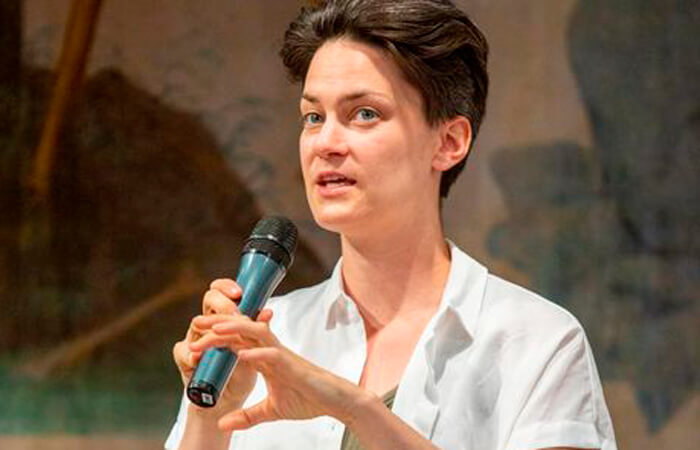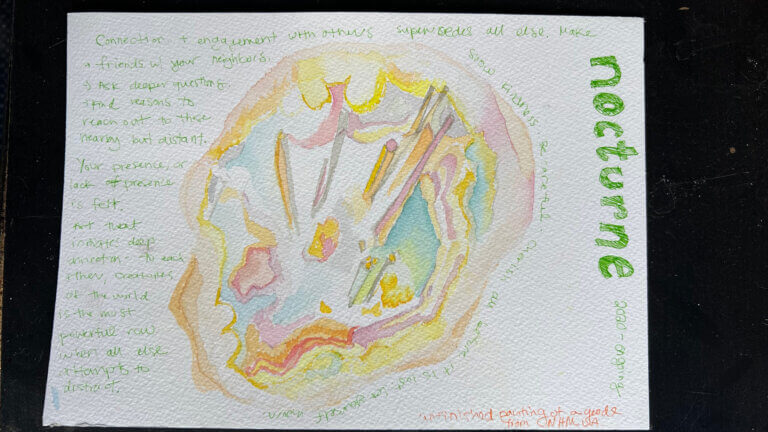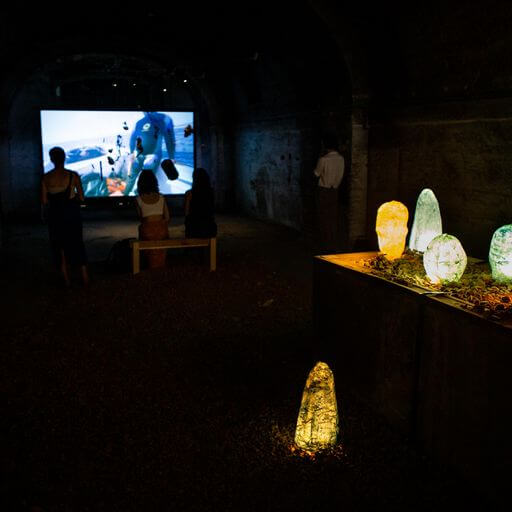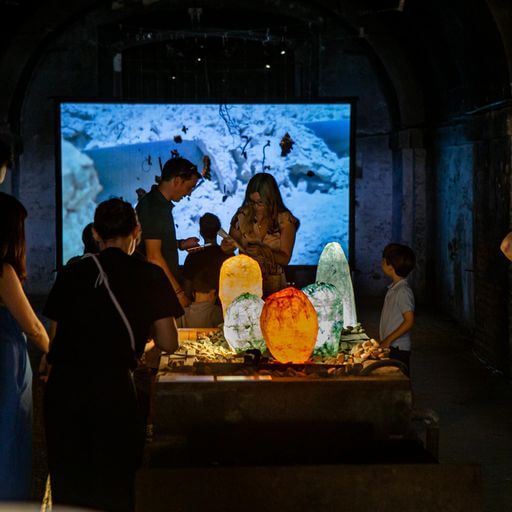Isabel Beavers
Find and foster deeper connections with those you have around you
My message is reflecting on my project Nocturne, that I created over the course of the Creatures Project. And I think what came up for me during this project, because it also happened in line with the pandemic, is this idea of concurrent moments of grieving or concurrent tragedies happening at once. There was so much loss globally and collectively, a lot of personal loss not only in my own life, but in the lives of those around me. And all of this, I think, is echoed by the grief we may or may not be dealing with due to the climate crisis and all the creatures and other species that we’re losing all the time. And so there’s this ongoing collective grief that’s sort of an umbrella over all these other smaller, maybe not smaller in folks lives, but less global moments of grief and tragedy. And so I think the lesson for me during this time that came out of this project is to think about how to find and foster deeper connections with those that you do have around you, from your family members to your friends. Some of the things that came up in this project are to connect with your neighbors, to ask more questions of your loved ones, ask deeper questions of your loved ones, and to find ways to cherish those that are around you that you have the potential to lose before they are lost. Also, to remember that art is always more powerful when you seek this connection and it can be so easily lost. We are so distracted today by technology. So I think one of the overarching lessons was to seek connection and engagement with others in all possible ways, and to remember that everyone’s presence or lack of presence is felt. So that’s my message to myself or to practitioners in the future, it’s to not forget how important it is to foster deep connections. It’s an ongoing, lifelong process. So I will take my message and put it in the bottle.
Building networks of care with other creators is really important
I think building networks of care with other creators is really important and we need that sort of transdisciplinary, collaborative thinking to really move forward with a lot of challenges we face as a society. I also am a teacher, so an educator. I work and teach in higher education and have worked in international exchange programs. So that’s quite flexible and I’ve worked with a lot of different types of student groups. Those are most of the things I do. Between all those things, ’m pretty busy, but they all feed into this idea of trying to not separate my creative practice in terms of my making from the rest of my life, and also have everything sort of support my vision for how I want my practice and career to evolve and grow in the future.
To detach from the scarcity mindset
At times it can feel like there are such limited resources for artists. So I think it also comes with a sense in one’s mind trying to detach from this scarcity mindset that there’s not enough to go around and really think about always sharing things as they come. And you’re seeing the gifts and the amazing skills and work that all of my colleagues are doing and wanting everyone to really succeed. And that means that we all, as a group, and as a cohort, and as a society, grow together.
Everyone’s knowledge together is stronger than anyone’s knowledge individually
The only way we have the possibility of approaching, creating solutions, adapting with the climate crisis, or any of these things comes from working across disciplines, and everyone’s knowledge together is stronger than anyone’s knowledge individually. And so I think that ethic comes out of very much like my learning early on in environmental studies and thinking about the transdisciplinary nature of ecologies, because there are so many overlapping entangled things and beings and elements and factors within that system, that you have to really approach things from a transdisciplinary perspective. And so I think that’s fed into this idea that even within arts communities we can work collaboratively, and that sort of comraderie and in collaboration is the only way we’ll have a possibility of moving forward in an ethical and productive way into the future.

About Isabel Beavers
Isabel Beavers is a transdisciplinary artist and creative producer based in Los Angeles. Her work explores ecologies, examines environmental histories and postulates about climate futures through multimedia installation + new media. Beavers’ work has been presented, exhibited, and screened at MODA (2021), New York Hall of Science (2020), CultureHub LA (2020), SUPERCOLLIDER Gallery (2020), MIT Museum (2019), Icebox Project Space (2019), Framingham State University (2018), Humbolt-Universität zu Berlin Thaer-Institut (2018), Mountain Time Arts (2017), Emerson Media Arts Center (2017) among others. She has held workshops at the Hammer Museum (2020) and the Institute of Contemporary Art/Boston (2019). She holds an MFA from the SMFA at Tufts University and a BS from the University of Vermont. She is currently Artistic Research Manager with SUPERCOLLIDER.
CreaTures resources
Beavers, I. (2022) Nocturne [Festival Pechakucha presentation]. CreaTures Festival, Sevilla, Spain.
Pirici, A. (2022). Entanglement [Festival keynote]. CreaTures Festival, Sevilla, Spain.
Petroiusti, L. (2022). How do we encounter climate breakdown? How do we negotiate the impossibly complex? [Festival keynote]. CreaTures Festival, Sevilla, Spain.
Choi, J. H-j., Botero, A., Ampatzidou, C., Beavers I., Dolejšová, M., Jain, A. & Lohmann, J. (2021). Re-membering with Fantastic Creatures. [Conference presentation]. Eco-creativity: Art, Music, Ritual and Global Climate Politics. 19 Nov 2021, Milton Keynes, UK.
Botero, A., Choi, J. H-j., Jain, A., Lapin, K., Sharma, S., Pineros, N., Lintunen, A. & Catlow, R. (2021). What is a forest? When is a forest? [Panel discussion]. Vienna Biennale for Change 2021.
Dolejšová, M., Ampatzidou, C., Choi, J. H-j., Botero, A., Beavers, I., Pokrywka, A., Van Amstel, F., Satomi, M. & Perner-Wilson, H. (2021). Feral Creative Practices Panel [Panel discussion]. Uroboros 2021 festival.
Choi, J. H. & Light. A. (2020). ‘The co-‘: Feminisms, Power and Research Cultures: A Dialogue. interactions 27(6). https://dl.acm.org/doi/10.1145/3429697
Houston, L., Light, A. & Braybrooke, K. (2020). How are Environmentally Engaged Arts and Cultural Organisations Responding to the COVID-19 Pandemic? CreaTures: Creative Practices for Transformational Futures, Rapid Response Working Paper v1.0


